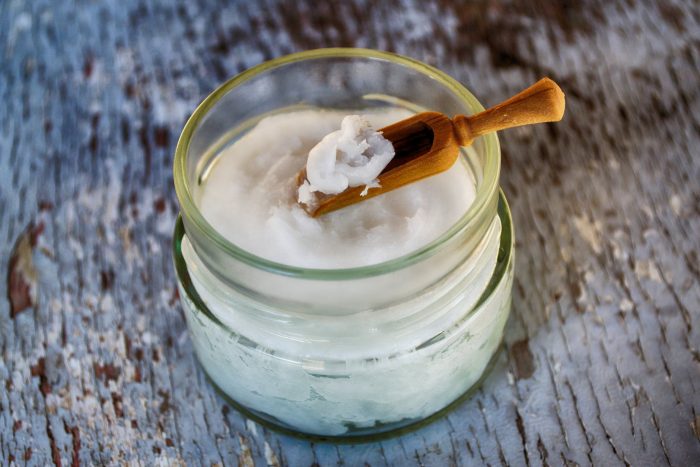*Editor’s Note: Elephant is not your doctor or hospital. Our lawyers would say “this web site is not designed to, and should not be construed to provide medical advice, professional diagnosis, opinion, or treatment to you or any other individual, and is not intended as a substitute for medical or professional care and treatment. Always consult a health professional before trying out new home therapies or changing your diet.” But we can’t afford lawyers, and you knew all that. ~ Ed
~
Coconut oil has seen a rise in popularity over the recent years, heralded by many as a fat-burning superfood.
Used as a “miracle solution” for seemingly any problem, coconut oil has long been the talk of the town. Or so it seemed. Coconut oil and its claims have recently come under fire from some renowned sources and people are starting to wonder just how much is fact, and how much is fiction. So…just how healthy is coconut oil?
Superfood: true or false?
Coconut oil, before becoming a beauty phenomenon, started out as a food, which is made by pressing oil from the coconut. As a food closely linked with healthy lifestyles (Victoria’s Secret models tote coconut water wherever they go) it would seemingly follow that coconut oil is healthy, too.
And yet. unlike a coconut’s flesh or water, coconut oil has a staggering 90 percent saturated fat—higher than butter or lard. Most coconut oils are also processed to a point where there are little to no nutrients left. Even the American Heart Association has denounced it—so where did the health food hype even come from?
A 2003 study at Columbia University by Dr. St-Onge on the dietary effects of medium chain triglycerides (a type of fat) convinced the world that coconut oil was the new superfood.
In the study, Onge basically found that medium chain triglycerides (MCTs) helped fat and weight loss. As coconut oil contains MCTs, the public took this as a sign that it would magically melt the fat off of them. The enthusiasm was doubled when it was reported that coconut oil can even raise levels of HDL (good cholesterol)
What people didn’t realise was that, although coconut oil does contain medium chain triglycerides, it’s not entirely made of them, whereas the fat in the study was a specifically formulated food that was solely made up of MGTs. Add that to experts explaining that coconut oil raises your LDL (bad cholesterol) alongside your HDL, and coconut oil is swiftly stripped of its superfood status.
Not to say that you shouldn’t ever eat coconut oil—as with any saturated fat, stick to the recommended guidelines and if you like it, have it on occasion—but as far as being a fat burning miracle? Don’t count on it.
So for food, it’s a lost cause, but what about beauty?
One of the many uses other than food people have found for coconut oil is for natural skin care—body oil, sunscreen, face moisturizer. But are these tips fact or fiction? The answer is both.
Fact, because if you have skin that’s prone to dryness and redness, coconut oil helps to lock in moisture and reduce inflammation, without added chemicals—unlike most creams and moisturizers.
Fiction, because if you have acne prone skin, then blocking your pores—which coconut oil does rather than seeping into skin—is the last thing you want to do. And as a sunscreen, forget it. There’s only about SPF 1 in coconut oil alone, and as experts recommend SPF 15 on a day-to-day basis, you will be falling short.
(As a replacement for shaving gel, coconut oil works wonders, though, so if you want smooth legs without the rash or graze, your jar of coconut oil isn’t totally wasted!)
Another hugely popular use for coconut oil is for sleek, shiny hair. Beauty icons suggest it in every capacity—hair mask, deep conditioner, leave in conditioner, hair oil—but is it actually hindering more than helping?
Like skin, the results are mixed according to hair type. Studies have shown that coconut oil can penetrate deep into hair shafts and reduce protein loss. But, like it does with skin, coconut oil coats the hair in a layer of oil, which can make it difficult for low porosity hair (usually rougher in texture) to get enough water, drying it out.
So, as promising as it seems, coconut oil is really just a miracle for the select—if you have the right hair, the right skin, and the right metabolism, you’re set. It is natural, after all, and if it works for you, perfect.
But if you have acne prone skin, rougher hair, and store fat like it’s nobody’s business, then this “superfood” will do nothing but lighten your wallet.







Read 0 comments and reply